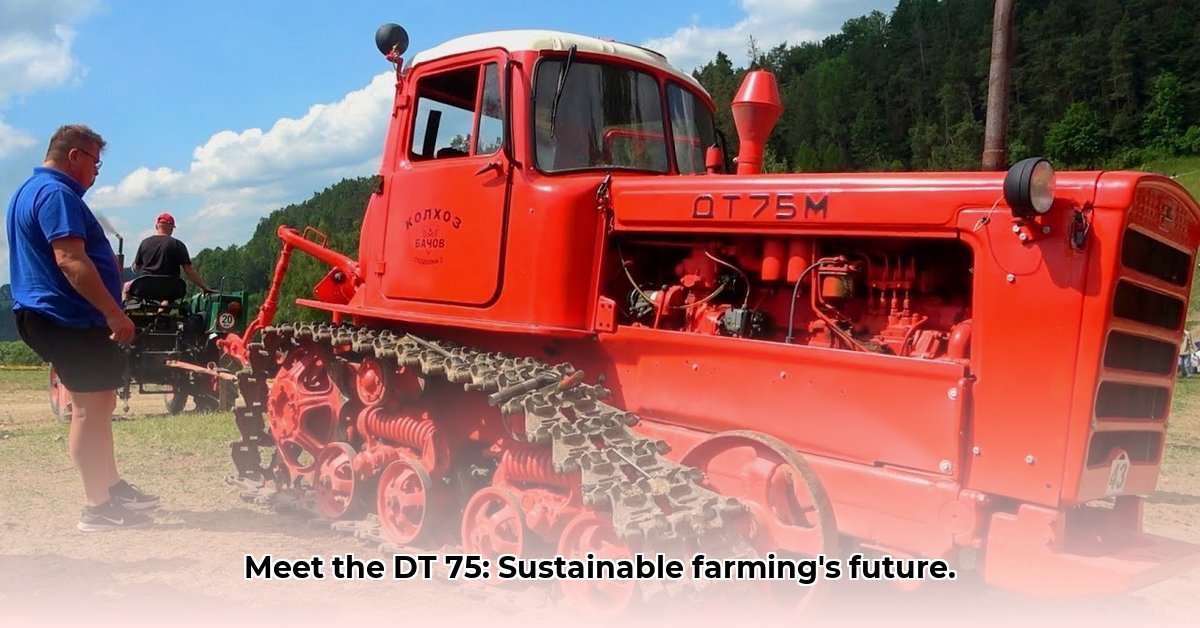
DT 75 Tractor: A Sustainable Farming Icon?
The DT-75 crawler tractor, a product of the Volgograd Tractor Factory, isn't your average modern farm machine. Built to last, it offers a compelling alternative in today's environment of rising fuel costs and heightened environmental concerns. Its tank-like treads minimize soil compaction, a key factor in sustainable agriculture. But can this vintage machine compete in today's high-tech farming world? Let's explore its strengths and weaknesses. For more tractor reviews, check out this helpful site.
A Legacy of Durability: Built to Endure
The DT-75's reputation for robustness is well-earned. These tractors are incredibly durable, designed to withstand decades of intensive use. Many are still operational today, a testament to their robust design and high-quality construction. This longevity significantly contributes to sustainability: reduced equipment turnover means less manufacturing, waste, and a lower carbon footprint. Isn't minimizing environmental impact a core principle of sustainable farming?
The Sustainability Equation: Advantages and Challenges
The DT-75 presents a mixed bag when it comes to sustainability. Let's dissect the pros and cons.
Advantages:
- Exceptional Longevity: The DT-75's durability reduces the need for frequent replacements, significantly lowering the environmental impact associated with manufacturing and disposal.
- Soil Conservation: The crawler tracks minimize soil compaction compared to wheeled tractors, promoting healthier soil and improved crop yields. This contributes to long-term soil health and sustainable farming practices. Isn't maintaining soil health crucial for long-term agricultural sustainability?
- Versatile Functionality: Its three-point hitch allows for the attachment of various implements, adapting it to a wide range of farm tasks.
Disadvantages:
- Parts Availability: Sourcing replacement parts can be challenging, leading to potential downtime and increased repair costs. How can we overcome this logistical hurdle and ensure continued operational efficiency?
- Specialized Maintenance: Maintaining a DT-75 requires specialized mechanical skills. Finding qualified mechanics can be difficult and expensive.
- Technology Integration: Integrating modern technologies like GPS guidance systems is often impractical due to the tractor's design. How can we modernize without compromising its robust mechanical structure?
Bridging the Gap: Modernizing a Classic
Despite its age, the DT-75 possesses significant potential within the sustainable farming context. But how can we enhance its capabilities?
Key improvements could include:
- Enhanced Parts Supply: Collaborations between parts suppliers and the DT-75 community are crucial. Reviving production of obsolete parts or identifying compatible modern replacements could resolve major downtime issues.
- Improved Maintenance Strategies: Agricultural researchers can collaborate to develop more efficient maintenance protocols and extend the operational lifespan of these machines.
- Strategic Technological Integration: While a complete technological overhaul might be impractical, incremental upgrades focusing on fuel efficiency are possible and highly desirable. Imagine the environmental benefits of even small fuel consumption reductions!
A Sustainable Future: Actionable Steps
To ensure the DT-75 remains a viable option for sustainable agriculture, we need a multi-pronged approach:
- Revitalizing the Parts Supply Chain: Support initiatives improving the availability of original or compatible parts through online marketplaces or established dealer networks. This will greatly reduce downtime caused by part shortages.
- Encouraging Reverse Engineering: Invest in research and development to reproduce or improve obsolete components. This requires collaboration between engineers and the DT-75 community to identify the most critical parts.
- Facilitating Knowledge Sharing: Encourage the establishment of online forums and resource hubs where owners can share maintenance tips, repair solutions, and parts sourcing information. Collective problem-solving is vital.
- Prioritizing Fuel Efficiency Upgrades: Focus on cost-effective modifications to enhance fuel efficiency, reducing operational costs and environmental impact.
Conclusion: A Legacy Worth Preserving
The DT-75 embodies a bygone era of durable machinery. Its remarkable resilience aligns perfectly with sustainable practices. With strategic investment and community engagement, the DT-75 can make a meaningful contribution to environmentally responsible farming. The challenge isn't the potential for sustainability, but the practical steps needed to realize it.